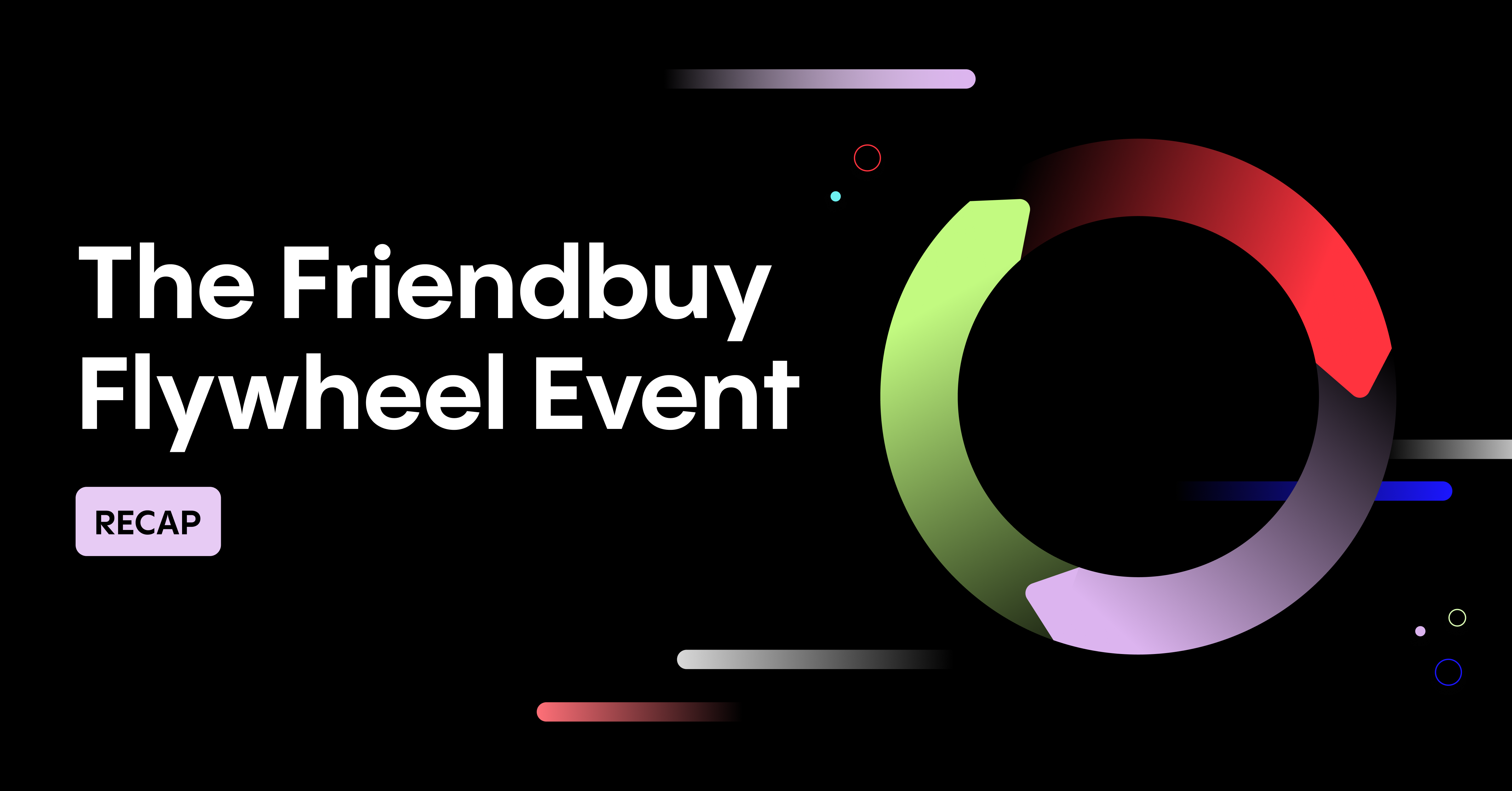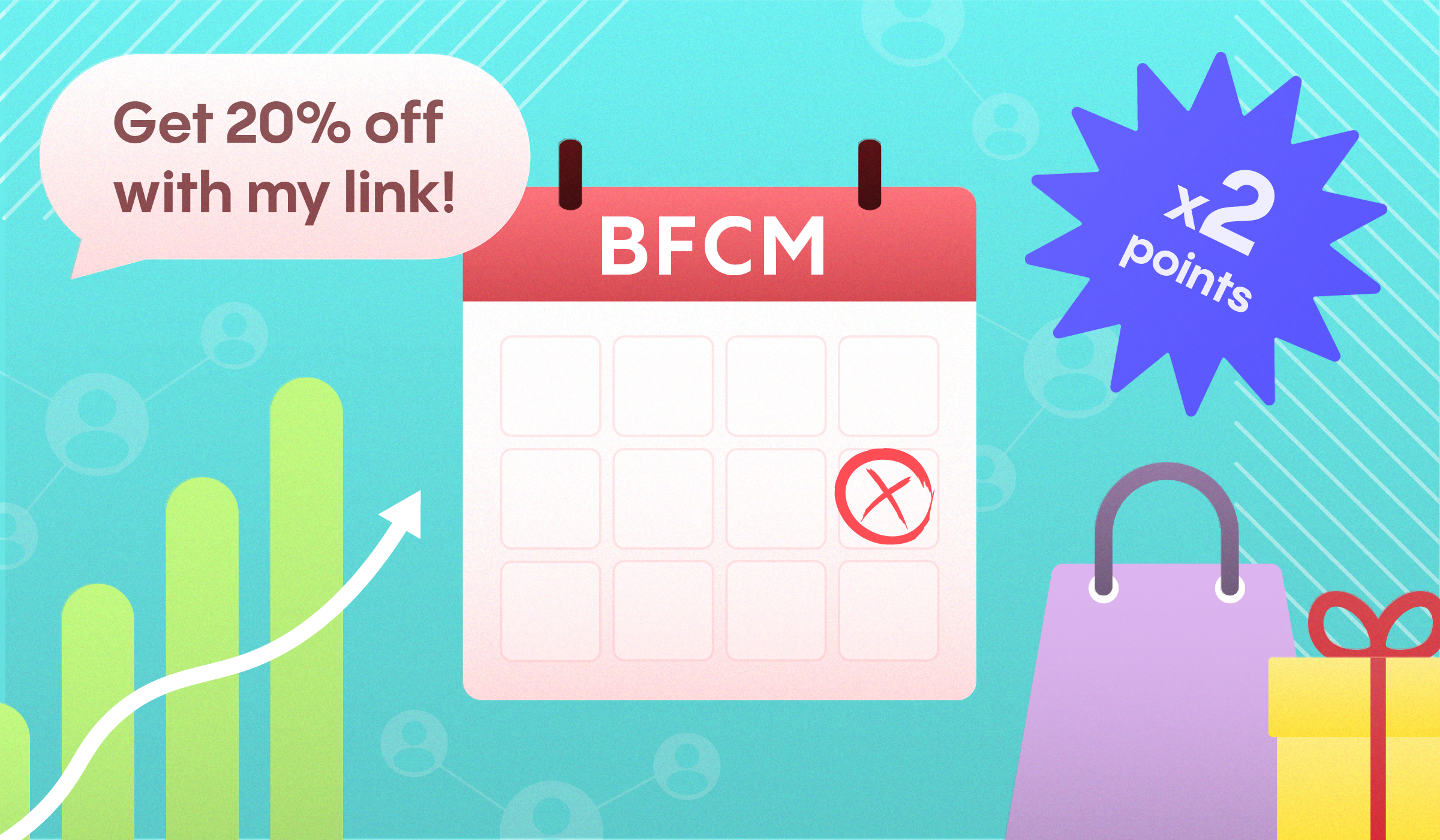Launching an eCommerce referral program is a highly effective way to increase sales, improve customer retention, drive product adoption and skyrocket customer lifetime value (CLV). This is because consumers respond more positively to word-of-mouth marketing practices — like customer referral programs — than they do other traditional forms of advertising.
And though this fact is widely understood by marketing professionals, many don’t feel that they’re doing it very well. According to research released by the Word of Mouth Marketing Association (WOMMA) and the American Marketing Association (AMA), 64% of marketing executives said they believe word-of-mouth is the most effective type of marketing. Only 6% say they felt as though they’d mastered it.
eCommerce brands that are able to formalize and optimize their customer referral programs and other word-of-mouth marketing initiatives have a clear edge over competitors. And accomplishing these tasks is not as difficult as many marketing executives seem to think.
What Is an eCommerce Referral Program?
An eCommerce referral program is a marketing initiative that taps into your existing customer base to reach more potential buyers who may be a good fit for your products or services. Customers who refer their friends (commonly called “advocates”) to your business receive a reward once a purchase is made or other valuable action is taken (such as signing up for a newsletter or downloading an app). Generally, the friend that was referred also receives some type of reward.
What exact actions trigger rewards, and what those rewards are, is entirely up to an individual business, though it should be noted that there are some best practices that can be broken down by industry vertical. For example, for cosmetic products, a referral offer of “Give $20, Get $20” works better than offering discounts as a percentage (e.g., 50% off).
The Benefits of an eCommerce Referral Program
Thinking of and treating your customers as a marketing channel opens up a world of possibilities for your team. When deployed effectively, a customer referral program can produce immediate and tangible benefits for brands that rely primarily on eCommerce to drive sales.
Referral program benefits include:
Increased Average Order Value (AOV)
What it is:
A critical metric for any eCommerce business to track, AOV measures the average total value of orders placed by customers over a certain period of time.
How an eCommerce referral program improves it:
Depending on which marketing channel has brought a customer to the point of purchase, customer AOV can vary highly. Customers that have engaged a business through a referral program tend to have an increased AOV when compared to regular customers due to the fact that they are usually a very good fit for the products or services on offer.
Higher Purchase Frequency
What it is:
Purchase frequency refers to how often customers make purchases from a particular online store within a given time frame.
How an eCommerce referral program improves it:
Since referral programs incentivize your existing customer advocates by rewarding them with discounts and gift cards, they are much more likely to make frequent purchases than other customers.
Improved Customer Lifetime Value (CLV)
What it is:
Customer Lifetime Value (CLV) represents the long-term revenue potential associated with a customer's relationship with a business.
How an eCommerce referral program improves it:
As customer retention improves, CLV typically increases due to prolonged patronage and repeated purchases. Studies have shown that even a small increase in customer retention can significantly boost a company's profitability over time.
Better Net Promoter Score (NPS)
What it is:
NPS measures a customers' likelihood to recommend a brand to others. It reflects customer satisfaction and loyalty, with higher scores indicating stronger advocacy.
How an eCommerce referral program improves it:
Rewarded customers are happier customers; and happier customers lead to higher a Net Promoter Score (NPS). By building a comprehensive eCommerce referral program, you can ensure that there are more “promoters” among your customer base, and can therefore expect a relatively strong NPS compared to competitors.
Decreased Churn Rate
What it is:
Customer churn rate refers to the percentage of customers who stop purchasing from an online store within a specific period.
How an eCommerce referral program improves it:
Referral programs help keep existing customers engaged with a brand and enrich the relationship between seller and buyer. This extends the average relationship between a customer and brand and decreases the average churn rate as a referral program grows.
Lower Cost per Acquisition (CPA)
What it is:
Cost per Acquisition (CPA) refers to the expenses incurred in acquiring new customers. Generally, it is used to measure the effectiveness and efficiency of marketing campaigns.
How an eCommerce referral program improves it:
Typically, eCommerce companies that deploy referral programs experience a much lower CPA through their word-of-mouth marketing efforts than through any other channel.
How To Launch an eCommerce Referral Program
Though the fine details of a customer referral program will vary depending on the type of eCommerce company running it, there are a few consistent elements to keep in mind as you plan out your program.
Identify Potential Advocates & Ambassadors
Before you start your program, it’s important to put together a strategy for identifying, targeting and engaging your current customers who are most likely to participate in a refer-a-friend program. This primes the pump so that when your referral program officially launches, you already have a group of loyal customers ready to start spreading the word about your business.
Here are a few tactics you may consider when completing this step in building a referral program:
- Monitor customer reviews: By keeping a close eye on your customers reviews, you’ll be able to spot the customers who are already raving about your brand online and most ready to become brand ambassadors.
- Look at purchase histories & data: One easy way to identify potential brand champions is to find customers that have made frequent or recent large purchases. These customers clearly are highly engaged with your business and it can be assumed they’d be very excited to be rewarded for sharing your products or services with their friends.
- Check social media: It’s more than likely that customers who would be willing to advocate for your brand are already doing so online. A company’s social media pages and online forums can be a great place to identify brand advocates and promote your referral program.
Choose Your Implementation: Build, Buy or Partner
When building a referral program for your eCommerce business, it’s important to think through your implementation strategy early. There are essentially three ways to get a referral program up and running:
- Build it yourself: If you have the capacity, you may opt to start from scratch and launch your referral marketing program entirely on your own. This means creating the software tools needed to run the program, including things like fraud prevention mechanisms and automated incentive delivery. This route is only really recommended for teams that have significant development resources and the time to bring the program to fruition.
- Purchase referral marketing software: Purpose-built referral program software platforms, such as Friendbuy, can make it much easier for marketing teams to run a successful eCommerce referral program. These SaaS tools typically provide a variety of robust features such as:
- A flexible design editor
- Referral stats & analytics
- Customizable earning actions & events
- Built-in A/B testing
- Partner with a team of referral marketing experts: Though dedicated referral marketing software can make it much easier to operationalize word-of-mouth marketing, the best way to ensure success is to partner with an experienced team of referral marketing experts to craft the ideal program for your brand. These teams can help you determine everything from the proper placement of banners to the type of incentives that should be given to advocates and their friends. For example, Friendbuy’s Customer Success Team has helped many top brands across all types of industries drive up to a 25x ROI from their eCommerce referral programs.
Seamless Integration
To create a referral program that scales, ensure yours is seamlessly integrated into your email and SMS marketing efforts. Ideally, if you’re using referral marketing software, it should be quite easy to integrate your email, SMS & push technology such as Klaviyo, Attentive, Iterable, Cordial and Braze to make the referral process easy and visible to your customers.
Add Call-to-Actions Everywhere
If you want your referral program to catch fire with your audience, it’s key to ensure the program is promoted across nearly every touchpoint that exists between you and your customers. Incorporate referral call-to-action banners into every email you send, place them strategically across your site, add them to the checkout page, and it’s even a good idea to create a dedicated referral program landing page where customers can see the rules and details of your program. This provides a constant reminder for customers to refer their friends and family and receive awesome rewards in exchange.
Provide Incentives That Matter
It’s important to offer enticing rewards that will resonate with your customers to incentivize referrals. What these incentives look like is entirely up to you, but it’s important that they provide something both advocates and the friends they share your brand with will find value in.
For example, these incentives may take various forms, such as discounts, exclusive access to upcoming features or products, or even monetary rewards for referrals (e.g. "Give $20, Get $20"). This alignment is key to optimizing the impact of your program.
Consistent Communication
Regularly remind your customers about your referral program. Send dedicated referral emails and texts to all customers to keep them engaged and aware of the benefits of referring others, with specially carved out emails for those that are most likely to engage in the program.,
By implementing these strategies, eCommerce companies can increase the visibility of their referral program and encourage consistent engagement from their customers to drive ongoing revenue for their brands.
eCommerce Referral Program Examples From Leading Brands
Let’s now take a look at some of the most successful eCommerce referral programs that have been implemented by top brands across a variety of industries.
1. Nuuly

Nuuly, a fashion rental platform, needed a way to drive fresh clientele after its debut. To achieve this objective, they initiated a referral marketing initiative via Friendbuy, employing adaptable designs and automated incentives to expedite program deployment. This approach resulted in a surge of over 2,500 recent subscribers within a short timeframe, primarily influenced by social media personalities across various platforms. Amplifying the promotion during festive seasons notably augmented revenue, setting new records for the company since its inception.
Explore Nuuly's success story here.
2. Thinx

Thinx, whose vision is a healthier world through sustainable solutions to menstruation and incontinence, introduced stackable credits on Shopify Plus via Friendbuy’s platform, revolutionizing their referral process. Automation streamlined code generation and reward validation, while a slick referral dashboard slashed customer service queries. The move turbocharged referrals, doubling the program's size and slashing acquisition costs to under $1 per customer.
Discover Thinx's journey here.
3. Tonal

Tonal needed a seamless advocacy marketing solution to complement its existing setup. Teaming up with Friendbuy, they crafted a referral program offering $50 to advocates and $100 off for referred friends upon purchase. The collaboration bore fruit, with around 10% of Tonal's customers jumping onboard the advocacy train, fueling remarkable revenue growth. The program's conversion rates skyrocketed to 500% higher than other channels, contributing a solid 7% to monthly revenue and climbing with each passing month, translating into millions in referral sales annually.
Dive into Tonal's success story here.
4. SPANX

SPANX, synonymous with shapewear excellence, pivoted to digital advocacy marketing with the help of Friendbuy. Customized product sharing campaigns pinpointed high-growth categories, running targeted referral drives with compelling messaging and visuals. The result? A staggering 15% conversion rate from referred customers and an 8% higher average order value. Specific campaigns, like those targeting product categories, turbocharged conversion rates by 26%, showcasing the power of strategic collaboration and relentless optimization.
Uncover SPANX's success story here.
5. woom

woom, the trailblazer in ultralight bikes, joined forces with Friendbuy to embed advocacy marketing seamlessly into their customer journey. By integrating advocacy nudges into emails and post-purchase communications, woom reaped a whopping 30x ROI shortly after launch. Clever segmentation and incentivization strategies, such as exclusive rewards for VIP subscribers, fostered loyalty and drove substantial advocacy engagement. Innovative campaigns, like referral giveaways, triggered a 58% surge in month-over-month revenue from the influx of subscribers.
Delve into woom's success story here.
6. Flaviar

Flaviar, the ultimate destination for premium spirits, uncorked a user-friendly advocacy marketing program in collaboration with Friendbuy. Tailored referral campaigns for different membership tiers, coupled with strategic event tie-ins, propelled referral revenue to new heights. During the COVID-19 pandemic, referral revenue surged, peaking at 9.2% of total revenue. With over 500 new members per month attributed to referrals at its peak, Flaviar's agile approach to marketing proved to be a game-changer.
Explore Flaviar's success story here.
7. Prose

Prose, the beacon of personalized hair and skincare solutions, harnessed the potential of advocacy marketing in a crowded industry. Armed with detailed customer data, Prose tailored their referral program to perfection, enhancing product customization and fueling targeted initiatives. By optimizing incentives and strategic placements across touchpoints, they achieved a 5% boost in conversion rates while keeping acquisition costs in the single digits. The result? An impressive 8x return on investment, proving the efficacy of their advocacy-driven strategy.









.avif)

